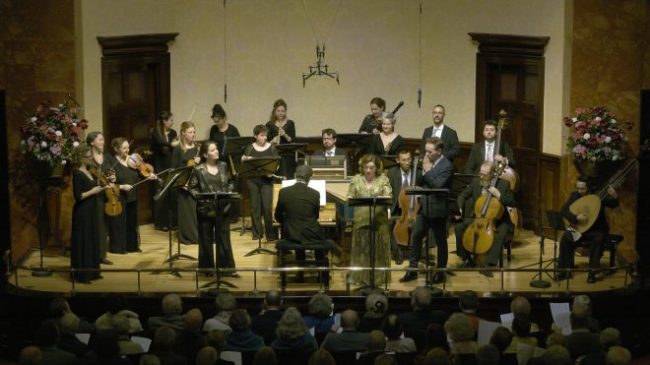 United Kingdom Handel, Clori, Tirsi e Fileno, HWV96: Soloists, The English Concert / Harry Bicket (director / harpsichord). Wigmore Hall, London, 18.10.2023. (CSa)
United Kingdom Handel, Clori, Tirsi e Fileno, HWV96: Soloists, The English Concert / Harry Bicket (director / harpsichord). Wigmore Hall, London, 18.10.2023. (CSa)

Cast:
Clori – Ailish Tynan (soprano)
Tirsi – Joélle Harvey (soprano)
Fileno – Iestyn Davies (countertenor)
Handel was just 22 years old and working in Rome when, in 1707, he completed his dramatic secular cantata for three voices Clori, Tirsi e Fileno. How the full score fell into the hands of a Jesuit priest by the name of Fortunato Cantini, and why it languished in the musical archives of the University of Münster until a musicologist stumbled upon it in 1960, remain something of a mystery. What a discovery! It is a rarely heard composition of jewel-like beauty, and one which exemplifies Handel’s inspirational musical genius from an extraordinarily early age as well as his nascent theatrical flair. This made this outstanding performance by the English Concert under the direction of Harry Bicket both timely and welcome.
The pastoral storyline on which Handel’s operatic miniature rests is a familiar one and can be incapsulated in the cantata’s subtitle ‘Cor fedele in vano speri’ (‘A faithful heart hopes in vain’). It is a three-way comic romance, a cocktail with all the usual ingredients: a dash of confusion, a measure of misunderstanding, and a large splash of deception. Set somewhere in Arcadia, Clori (beguilingly and beautifully sung by the Irish soprano Ailish Tynan), is a two-timing shepherdess, and the object of the affections of two young shepherds: the agitated, impetuous Tirsi (New York based mezzo-soprano Joélle Harvey in glorious voice) and the despondent Fileno (a dazzling performance by countertenor Iestyn Davies). She agrees to marry both of them. The lads form a firm friendship when they discover that they have been deceived, but ruefully acknowledge that true love must always involve suffering.
Like the plot, many of the cantata’s gorgeous melodies are recognizable. Handel, one of the greatest exponents of musical sustainability, skilfully recycled them into some of his later operas. The magnificent overture was reused at least twice in Oreste and two duets were later deployed in Rinaldo. Tirsi’s erotic Part 2 aria ‘Un sospiretto d’un labbro pallido’ (‘A little sigh, pale lips’) reappeared in Rodrigo while Clori’s exquisite aria ‘Amo Tirsi’ also featured in Agrippina as well as in the English version of Acis and Galatea.
Handel’s glorious score was brought to life in this fresh and compellingly authentic production by sixteen members of the English Concert on period instruments, directed with unobtrusive precision by Harry Bicket at the harpsichord. Central to the performance, though, were the three outstanding soloists.
Ailish Tynan’s portrayal of the coquettish, inconstant Clori could not be bettered. She possesses a full, rounded and supple voice which when combined with her innate talent for comedic drama made her ideally suited to the role. Her ability to transform herself from a coy, manipulative seductress in the aria ‘Conosco che mi piaci’ (‘I know that you please me’) to self-righteous victim ‘Barbaro! Tu non credi’ (‘Hard man! Do you not believe?’) was entirely credible.
Joélle Harvey, recently acclaimed for her outstanding performance this summer at Glyndebourne in the role of Semele, has established herself as a Handelian singer of the first rank. Her tone is as bright as polished silver, and the remarkable agility of her coloratura made light work of the high trills and sweeping runs demanded by Handel to express the wounded Tirsi’s fits of pique. Harvey’s delivery of arias such as ‘Cor Fedele, in vano’ (‘My faithful heart, you hope in vain’) which opens Part 1, and ‘Tra le fere la fera piú’ (‘Out of all the beasts, no beast could be more cruel’) was not only technically faultless, but dramatically conveyed the unhappy Tirse’s anger and indignation.
The third member of the trio, Iestyn Davies, sang with radiant purity and free-soaring clarity. The perfect foil to Harvey’s volatile Tirse, Davies’s Fileno cut a more emotionally restrained and melancholy figure. His arias unfolded and enveloped the listener like swathes of velvet. They culminated in a tender rendition of ‘Come la rondinella dall’Egito’ (‘Just as the Swallow’), brilliantly accompanied by Sergio Bucheli on theorbo.
Individually formidable, the singers were at their best when all three voices wove and melded together in the final trio, an uplifting and unforgettable paean of love and hope.
Chris Sallon
